We may not have the course you’re looking for. If you enquire or give us a call on 01344203999 and speak to our training experts, we may still be able to help with your training requirements.
Training Outcomes Within Your Budget!
We ensure quality, budget-alignment, and timely delivery by our expert instructors.

Completing your undergraduate degree is a significant accomplishment, but it's often just the beginning of your educational journey. Choosing the best professional courses after graduation can be crucial for your career advancement and personal growth. Pursuing a professional course after graduation enhances career prospects by providing specialised knowledge, skills, and industry connections.
By acquiring expertise in specific fields, individuals can access diverse job opportunities and command higher salaries. In this blog, we'll explore the top 20 professional courses that you can consider after completing your undergraduate studies.
Table of Contents
1) Top 20 Best Professional Courses After Graduation
a) MTech (Master of Technology)
b) MA/MSc Economics
c) MBA (Master of Business Administration)
d) Tally
e) MA/MSc Statistics/Mathematics
f) PGD in Hotel Management
g) M.com (Master of Commerce)
h) CFA (Certificate In Finance & Accounting)
i) PGDM
j) Digital Marketing
2) Conclusion
Top 20 Best Professional Courses After Graduation
Pursuing a professional course after graduation offers specialised expertise, increased job opportunities, and career advancement. These courses provide focused training, networking opportunities, and adaptation to industry trends, enhancing personal and professional growth.
Professional courses empower individuals to stay competitive in dynamic job markets, explore diverse career paths, and make meaningful contributions to their fields of interest. Below are the Top 20 Courses that will give you an edge over your peers in the competitive professional space.
1) MTech (Master of Technology)
MTech, short for Master of Technology, is a post-graduation academic degree pursued by students who seek advanced knowledge and expertise in specific fields of engineering and technology. It is an extension of the undergraduate engineering curriculum, providing deeper insights into theoretical concepts and practical applications.

Job prospects for MTech graduates:
1) Research and Development Engineer: Post graduation professionals often work in research and development departments, contributing to the creation of new technologies and innovations through experimentation and analysis.
2) Project Manager: With their technical expertise and organisational skills, MTech graduates are well-suited for Project Management roles, overseeing the planning, execution, and delivery of engineering projects.
3) Software Developer/Engineer: MTech graduates specialising in computer science or software engineering develop and maintain software applications, leveraging their skills and knowledge of algorithms and data structures.
4) Data Scientist/Analyst: MTech graduates with expertise in data science and Machine Learning analyse large datasets, extract valuable insights, and develop predictive models to support data-driven decision-making in various industries.
5) Consulting Engineer: MTech graduates provide technical consultancy services to businesses and organisations, offering expertise in areas such as engineering design, optimisation, and problem-solving to address complex challenges and drive innovation.
Let's see the average salary for the above job titles in the UK:
|
Job role |
Average base salary (per year) |
|
Research and Development Engineer |
£36,506 |
|
Project Manager |
£52,064 |
|
Software Developer/Engineer |
£46,358 |
|
Data Scientist/Analyst |
£58,339 |
|
Consulting Engineer |
£69,379 |
Source: Glassdoor
2) MA/MSc Economics
Pursuing a Master of Arts (MA) or Master of Science (MSc) in Economics offers individuals a deep understanding of economic principles, theories, and methodologies. This post-graduation advanced degree equips graduates with analytical skills and critical thinking abilities essential for addressing complex economic challenges and making informed decisions in various sectors.
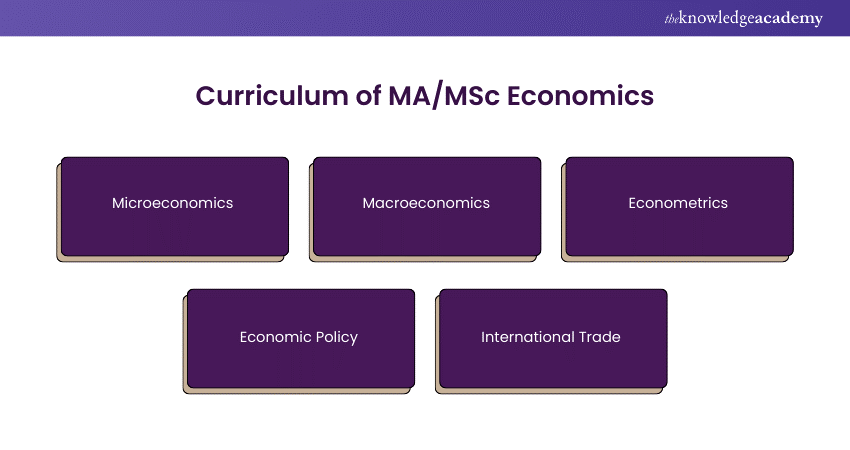
Job prospects for MA/MSc Economics students' post-graduation:
1) Economist: MA/MSc Economics graduates often work as Economists, conducting research, analysing economic data, and providing insights into economic trends and policies for government agencies, financial institutions, research organisations, and consulting firms.
2) Policy Analyst: They may work as Policy Analysts, evaluating the economic impact of policies and regulations, providing recommendations to policymakers, and contributing to the formulation of economic policies at local, national, or international levels.
3) Financial Analyst: Graduates can pursue careers as Financial Analysts, analysing market trends, assessing investment opportunities, and providing recommendations for portfolio management, risk assessment, and financial planning for banks, investment firms, and corporations.
4) Data Analyst: With their quantitative and analytical skills, they are well-suited for roles as Data Analysts, where they analyse large datasets, extract insights, and develop statistical models to support decision-making in industries such as finance, healthcare, and market research.
5) Researcher/Academic: Many MA/MSc Economics graduates pursue careers in academia or research institutions, conducting economic research, publishing scholarly articles, and teaching courses in universities and colleges, adding to the advancement of economic knowledge and theory.
Let's see the average salary for the above job titles in the UK:
|
Job Title |
Average Salary (GBP) |
|
Economist/Analyst |
£54,863 |
|
Policy Analyst |
£39,685 |
|
Financial Analyst |
£40,578 |
|
Data Analyst |
£38,070 |
|
Researcher/Academic |
£37,020 |
Source: Glassdoor
3) MBA (Master of Business Administration)
The Master of Business Administration (MBA) is a post-graduation degree that equips individuals with the knowledge and skills required to excel in various aspects of business management and leadership. It is one of the most sought-after post-graduation qualifications globally, offering a comprehensive understanding of business principles, strategies, and practices.
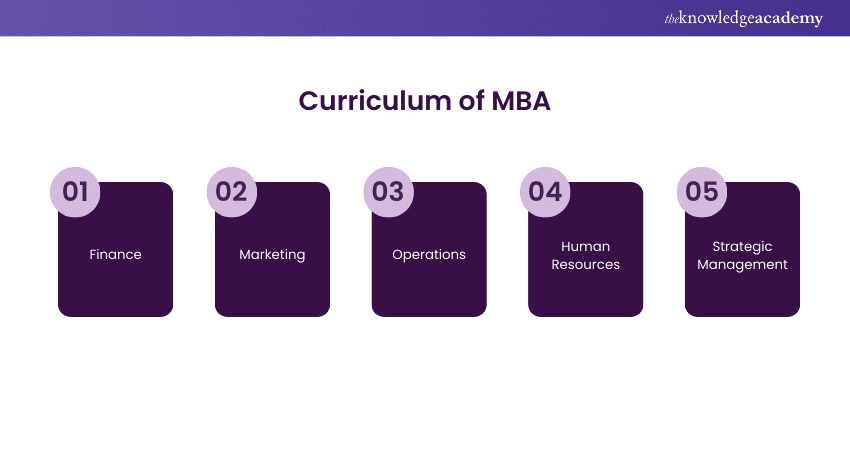
Job prospects for MBA Graduates:
1) Management Consultant: MBA students' post-graduation often enter the professional field of management consulting, where they provide expert advice to companies on strategic decisions, operational efficiency, and organisational structure.
2) Marketing Manager: With a specialisation in marketing, MBA graduates can pursue professional roles as Marketing Managers, overseeing branding, advertising, and market research efforts to drive sales and market share.
3) Financial Analyst: They focus on work as professional Financial Analysts, analysing investment opportunities, assessing financial risks, and providing recommendations for portfolio management.
4) Operations Manager: MBA graduates specialising in operations management can become professional Operations Managers, responsible for optimising processes, managing resources, and ensuring smooth business operations.
5) Entrepreneur: Many MBA graduates choose to enter the professional world as Entrepreneurs, leveraging their business knowledge and leadership skills to launch and manage successful ventures.
Let's see the average salary for the above job titles in the UK:
|
Job title |
Average salary (GBP) |
|
Management Consultant |
£51,100 |
|
Marketing Manager |
£67,582 |
|
Financial Analyst |
£40,538 |
|
Operations Manager |
£48,968 |
|
Entrepreneur |
£49,732 |
Source: Glassdoor
4) Tally
Tally is an extensively used accounting software that simplifies financial management tasks for businesses of all sizes. Undertaking a Tally post-graduation course provides individuals with essential skills to efficiently handle accounting, inventory management, taxation, and financial reporting tasks using the software.
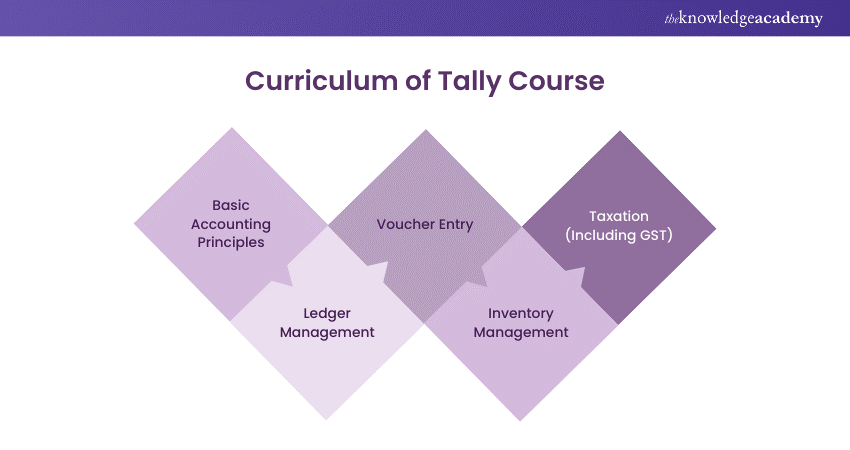
Job Roles post completion of Tally course:
1) Accountant: After completing a Tally post-graduation course, individuals can pursue professional roles as Accountants, where they manage financial records, prepare and analyse financial statements to align compliance with accounting principles and regulations.
2) Financial Analyst: Professionals with Tally expertise may work as Financial Analysts, conducting financial research, analysing data, and providing insights to support investment decisions, budgeting, and financial planning for organisations.
3) Tax Consultant: Tally professionals can specialise as Tax Consultants, offering professional advice and services related to tax planning, compliance, and filing. They assist businesses in navigating complex tax laws and regulations to optimise tax outcomes.
4) Audit Associate: Tally-certified individuals can pursue roles as Audit Associates, where they perform professional audits of financial records, assess internal controls, and identify areas for improvement to ensure accuracy and compliance with industry standards.
5) Tally Consultant: With advanced knowledge of Tally software, professionals can work as Tally Consultants, providing professional consultancy services to businesses on software implementation, customisation, troubleshooting, and optimisation to meet their specific accounting needs.
Let's see the average salary for the above job titles in the UK:
|
Job title |
Average salary (GBP) |
|
Accountant |
£30,454 |
|
Financial Analyst |
£45,123 |
|
Tax Consultant |
£40,876 |
|
Audit Associate |
£36,004 |
|
Tally Consultant |
£48,457 |
Source: Glassdoor
Improve your Tally skills through our Tally Training.
5) MA/MSc Statistics/Mathematics
Pursuing a Master of Arts (MA) or Master of Science (MSc) post-graduation degree in Statistics or Mathematics provides individuals with advanced training in quantitative analysis, data interpretation, and mathematical modelling. These courses are considered as some of the Best Courses After Graduation, equip students with the theoretical knowledge and practical skills necessary to address complex problems in various fields.
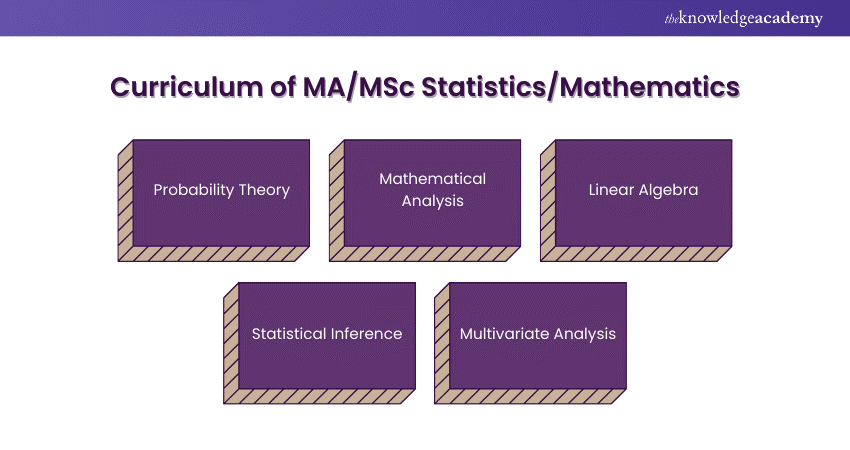
Job roles after MA/MSc Statistics/Mathematics:
1) Data Scientist/Analyst: Specialising in Data Science prepares graduates for roles analysing data and deriving insights for businesses and organisations.
2) Actuary: Graduates specialising in Actuarial Science assess financial risks for insurance companies and financial institutions.
3) Quantitative Analyst: Those with a focus in Quantitative Finance analyse financial markets and manage investment portfolios using mathematical models.
4) Biostatistician: Biostatistics specialists analyse health-related data for pharmaceutical companies and research institutions.
5) Operations Research Analyst: Operations Research specialists optimise business processes and supply chains using mathematical techniques.
Here is the average salary for the above positions in the UK:
|
Job title |
Average salary (GBP) |
|
Data Scientist/Analyst |
£58,339 |
|
Actuary |
£77,457 |
|
Quantitative Analyst |
£97,776 |
|
Biostatistician |
£44,987 |
|
Operations Research Analyst |
£32,105 |
Source: Glassdoor
Improve your strategic planning through our Strategic Planning and Thinking Training Course!
6) PGD in Hotel Management
A Postgraduate Diploma (PGD) in Hotel Management is a specialised post-graduation course designed to equip individuals with the knowledge essential to excel in the hospitality industry. It provides comprehensive training in hotel operations, guest services, food and beverage management, and hospitality marketing.
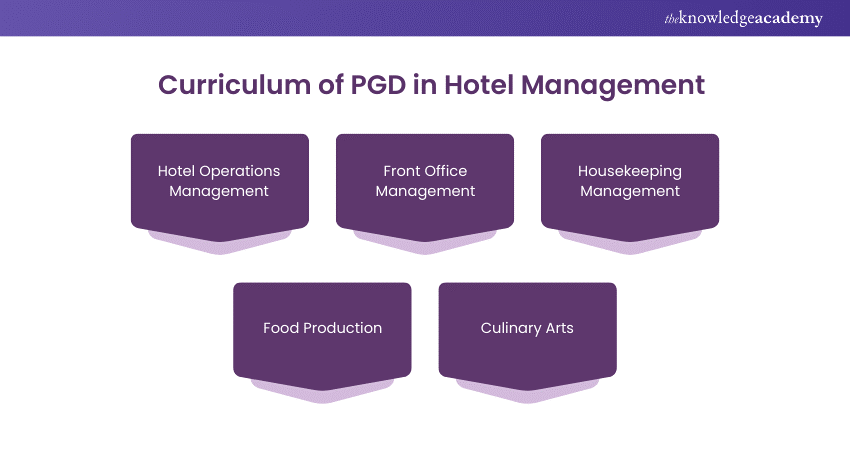
Job roles for PGD in Hotel Management:
1) Hotel Manager: Graduates of PGD in Hotel Management often ascend to the role of Hotel Manager, overseeing all aspects of hotel operations, such as guest services, staff management, and financial performance.
2) Restaurant Manager: Professionals with a post-graduation may pursue roles as Restaurant Managers, responsible for managing daily operations, ensuring customer satisfaction, and maintaining quality standards in food and service.
3) Food and Beverage Manager: Those specialising in Hotel Management can work as Food And Beverage Managers, overseeing the culinary operations, menu planning, and beverage services in hotels, restaurants, and catering establishments.
4) Front Office Manager: Front Office Managers handle guest relations, reservations, and check-in/check-out procedures in hotels, ensuring a seamless guest experience and maintaining professional standards.
5) Event Manager: Graduates of Hotel Management courses can specialise as Event Managers, organising and coordinating professional events, conferences, weddings, and other special occasions for clients and organisations.
Let's see what the average salary for the above roles is in the UK:
|
Job title |
Average salary (GBP) |
|
Hotel Manager |
£37,003 |
|
Restaurant Manager |
£26,069 |
|
Food and Beverage Manager |
£26,871 |
|
Front Office Manager |
£32,154 |
|
Event Manager |
£37,475 |
Source: Glassdoor
7) Master of Commerce (M.Com)
Master of Commerce is a post-graduation academic course that provides students with advanced knowledge on various aspects of commerce, accounting, finance, and economics. This course is designed to offer a deeper understanding of business concepts and practices, preparing individuals for leadership roles in the corporate world.
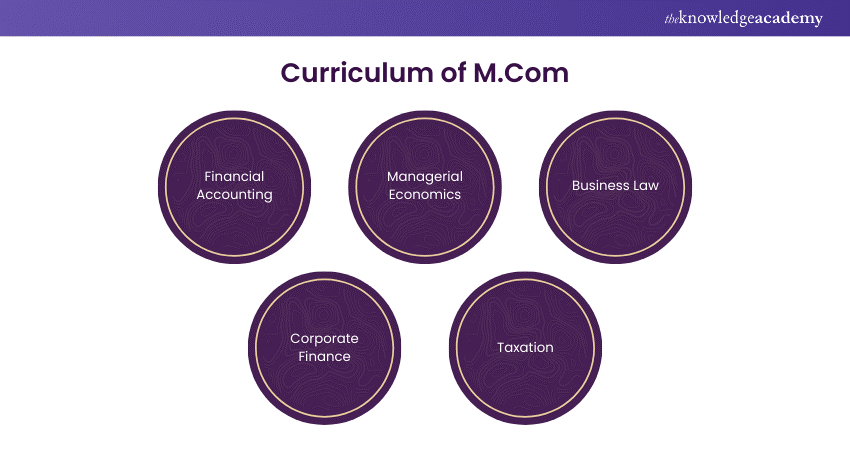
Job Roles with a M.Com degree:
1) Financial Analyst: M.Com graduates often step into roles as Financial Analysts, utilising their professional knowledge in financial analysis and management to assess investment opportunities, analyse financial data, and provide strategic recommendations to businesses and organisations.
2) Accountant: With their expertise in accounting principles and practices, M.Com graduates can pursue professional roles as Accountants, managing financial records, preparing financial statements, and ensuring compliance with regulatory standards for businesses and firms.
3) Tax Consultant: M.Com professionals may specialise as Tax Consultants, offering professional advisory services to individuals and businesses on tax planning, compliance, and optimisation strategies, leveraging their in-depth understanding of taxation laws and regulations.
4) Financial Manager: Graduates with an M.Com degree are equipped to assume professional roles as Financial Managers, overseeing financial operations, budgeting, and financial reporting for organisations, ensuring sound financial management practices and fostering business growth.
5) Auditor: M.Com graduates can pursue careers as Auditors, conducting professional audits of financial statements, internal controls, and operational processes to assess compliance, identify risks, and provide recommendations for improvement to ensure organisational efficiency and integrity.
The average salaries for the above roles are given below in the UK:
|
Job title |
Average salary (GBP) |
|
Financial Analyst |
£43,678 |
|
Accountant |
£30,054 |
|
Tax Consultant |
£41,589 |
|
Financial Manager |
£57,879 |
|
Auditor |
£36,783 |
Source: Glassdoor
8) Certificate In Finance & Accounting (CFA)
The Certificate in Finance & Accounting (CFA) is a globally recognised post-graduation professional course designed for individuals seeking expertise in finance, accounting, investment analysis, and portfolio management. It offers comprehensive training and certification in key financial areas, preparing candidates for challenging roles in the finance industry.
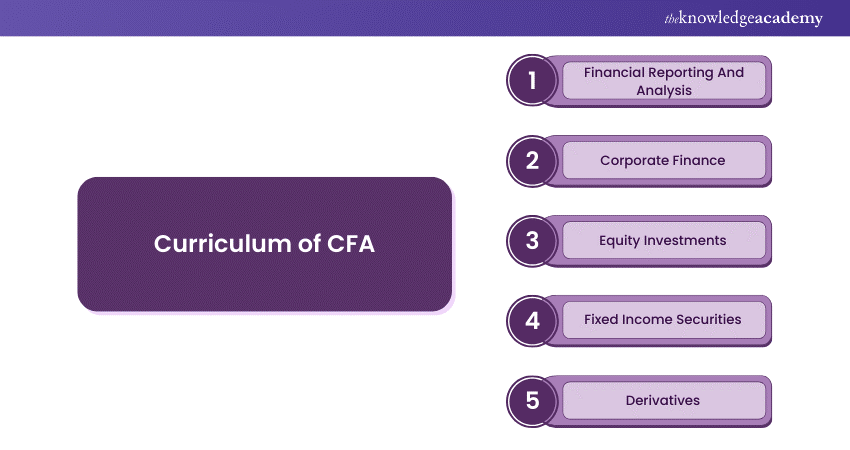
Job roles for professionals with CFA degree:
1) Financial Analyst: CFA graduates commonly pursue roles as Financial Analysts, utilising their advanced knowledge in finance and accounting to analyse financial data, evaluate investment opportunities, and provide strategic recommendations to clients or organisations.
2) Investment Banker: Many CFA professionals work as Investment Bankers, facilitating mergers and acquisitions, underwriting securities, and advising clients on capital raising strategies, leveraging their expertise in financial analysis and valuation.
3) Portfolio Manager: CFA holders often become Portfolio Managers, responsible for managing investment portfolios, making asset allocation decisions, and optimising investment strategies to achieve client objectives while managing risk.
4) Risk Manager: CFA designation holders can specialise as Risk Managers, assessing and mitigating financial risks within organisations, including market risk, credit risk, and operational risk, to ensure financial stability and regulatory compliance.
5) Financial Planner: CFA professionals may work as Financial Planners, assisting clients in setting financial goals, developing investment plans, and providing comprehensive financial advice and solutions tailored to individual needs and circumstances.
Average salary for the above job description is given below in the UK:
|
Job title |
Average salary (GBP) |
|
Financial Analyst |
£43,678 |
|
Investment Banker |
£60,000 |
|
Portfolio Manager |
£66,781 |
|
Risk Manager |
£62,035 |
|
Financial Planner |
£62,776 |
Source: Glassdoor
9) PGDM
Post Graduate Diploma in Management is a rigorous and comprehensive post-graduation course designed to prepare individuals for leadership roles in the corporate world. This post-graduation course provides students with a blend of theoretical knowledge and practical skills necessary to navigate the complexities of the business environment.
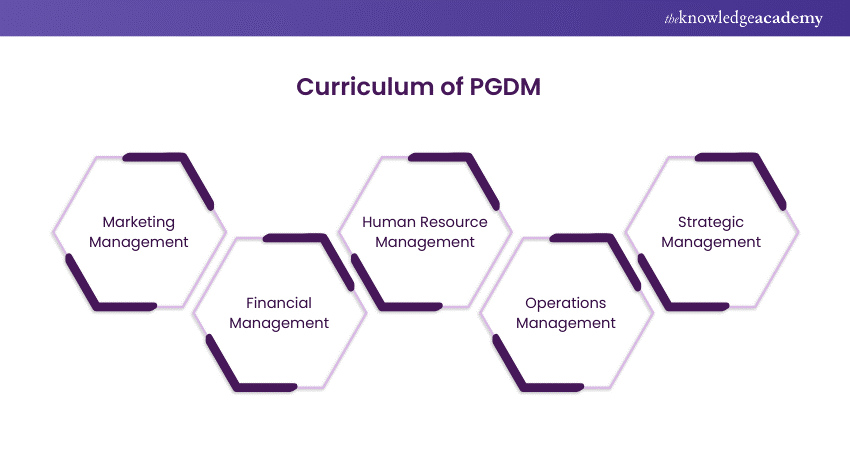
Job roles with a PGDM degree:
1) Marketing Manager: PGDM graduates often assume roles as Marketing Managers, responsible for developing and implementing marketing strategies to promote products or services, analyse market trends, and manage marketing campaigns effectively.
2) Financial Analyst: Graduates of PGDM courses frequently work as Financial Analysts, analysing financial data, evaluating investment opportunities, and providing recommendations to optimise financial performance and support strategic decision-making.
3) Human Resource Manager: PGDM holders may pursue careers as Human Resource Managers, overseeing recruitment, employee relations, training, and performance management initiatives to ensure organisational effectiveness and employee satisfaction.
4) Operations Manager: Many PGDM professionals excel as Operations Managers, responsible for optimising business operations, managing resources, and implementing strategies to improve efficiency and productivity within organisations.
5) Business Consultant: PGDM graduates often transition into roles as Business Consultants, providing professional advice and solutions to businesses on various aspects of management, including strategy formulation, process improvement, and organisational development.
Conclusion
The diverse array of courses outlined here presents post-graduation opportunities across various fields, helping graduates to opt for the Best Courses After Graduation. From data science to tax consultancy, each offers specialized skills for professional growth. Ultimately, graduates embark on a journey guided by passion and ambition, shaping their futures with determination and continuous learning.
Enhance your career growth through our Career Development Masterclass!
Frequently Asked Questions

Certainly! There are specialized courses tailored for technology enthusiasts' post-graduation like Data Science, Cybersecurity, Software Development, Cloud Computing and Data Engineering. These courses offer focused training in areas like big data, programming, security, and emerging technologies, preparing individuals for diverse roles in the tech industry.

Yes, several short-term courses can enhance employability post-graduation like Digital Marketing, Project Management, Graphic Design, Web Development and Entrepreneurship. These courses offer focused training on specific skills highly sought after by employers, preparing individuals for immediate entry into the workforce.

The Knowledge Academy takes global learning to new heights, offering over 30,000 online courses across 490+ locations in 220 countries. This expansive reach ensures accessibility and convenience for learners worldwide.
Alongside our diverse Online Course Catalogue, encompassing 17 major categories, we go the extra mile by providing a plethora of free educational Online Resources like News updates, Blogs, videos, webinars, and interview questions. Tailoring learning experiences further, professionals can maximise value with customisable Course Bundles of TKA.

The Knowledge Academy offers various Personal Development Training, including Time Management Training, Attention Management Training, Motivational and Goal Setting Training. These courses cater to different skill levels, providing comprehensive insights into Building Self-Discipline: How to Build Your Confidence
Our Career Growth Blogs covers various topics related to Career Growth, offering valuable resources, best practices, and industry insights. Whether you are a beginner or looking to advance your Project Management skills, The Knowledge Academy's diverse courses and informative blogs have you covered.

The Knowledge Academy offers various Personal Development Training, including Time Management Training, Attention Management Training, Motivational and Goal Setting Training. These courses cater to different skill levels, providing comprehensive insights into Building Self-Discipline: How to Build Your Confidence
Our Career Growth Blogs covers various topics related to Career Growth, offering valuable resources, best practices, and industry insights. Whether you are a beginner or looking to advance your Project Management skills, The Knowledge Academy's diverse courses and informative blogs have you covered.
Upcoming Business Skills Resources Batches & Dates
Date
 Career Development Course
Career Development Course
Fri 28th Feb 2025
Fri 4th Apr 2025
Fri 27th Jun 2025
Fri 29th Aug 2025
Fri 24th Oct 2025
Fri 5th Dec 2025







 Top Rated Course
Top Rated Course



 If you wish to make any changes to your course, please
If you wish to make any changes to your course, please


